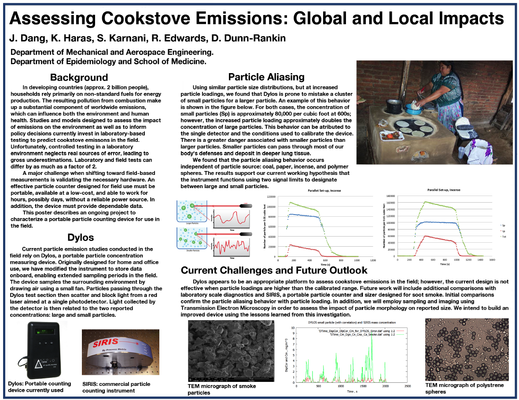Assessing Cookstove Emissions: Global and Local Impacts
The U.S. Department of State recently announced the Global Climate Change and Clean Air Initiative in partnership with Bangladesh, Canada, Mexico, and Sweden, with the UN Environment Program coordinating the coalition. The focus of this initiative is on short-lived climate pollutants, which together account for 2.5 million deaths annually from related health effects and account for more than a third of current global warming impact. These species have a much greater significance than people generally recognize, and it has been estimated that implementation of actions to reduce short-lived climate pollutants could slow global warming by a half degree Celsius by 2050. Cookstove emissions in the developing world are a major global source of short-lived climate pollutants, yet measurements of these emissions and the demonstrated efficacy of reductions are relatively few, largely as a result of the lack of simple robust monitoring platforms that can assess emissions easily and readily in the field. Given the national focus on short-lived climate pollutants, UCI would be well served by positioning itself as a research leader in this area by developing monitoring tools and measurement protocols that can be used in future research initiatives.
This current proposal to the Environment Institute seed-funding program is to initiate and bolster a joint research effort in the crossover space of culturally and technologically appropriate emissions measurements. Specifically, we propose to apply engineering design approaches to create emission measurement tools that can effectively and appropriately monitor cookstoves in both laboratory and field environments. Such tools must be compact, quiet, low maintenance, and low power, as they must operate remotely for long periods far from recharging sources. The first objective is a system with wide dynamic range that can be used on cookstoves with and without flues; this small operational difference produces a large variation in exhaust particle concentration. The examination of the operating performance as compared with current filter (i.e., average) methods and a novel commercial particle monitor designed in situ use will take place. There will be a development of a record of accomplishments in relating field and laboratory measurements of cookstove emissions and the exploration of methane emissions monitoring. This work has both cultural (how cookstoves are used worldwide and how to obtain permission for measuring them in place) and scientific (e.g., real time monitoring of black carbon as related to cookstove use) aspects that meet the goals of the Environment Institute. In addition to the PIs, the project will involve graduate student researchers and also undergraduate students in an engineering design project.

